The Islamic Human Rights Commission has been committed to fighting Islamophobia since its inception. On the eve of this year’s Islamophobia Conference, we have outlined resources and books published by IHRC that we recommend for you. Please scroll down to see.
Since 2014, IHRC has organised an annual conference in the UK to discuss key issues with regard to structural and institutionalised Islamophobia.
Each conference has been co-organised with Scotland Against Criminalising Communities (SACC). Join us for the 11th annual conference this December, online and in-person.
Dates and times:
This year’s conference will bring together experts in the field over the course of two days for online and in-person discussions:
- Saturday 14 December (online only)
Watch LIVE on YouTube, Facebook, and IHRC.TV
Time: 11.30am to 4pm GMT
- Sunday 15 December (online and in-person)
Venue: P21 Gallery (21 Chalton St, London NW1 1JD)
Time: 10.30am to 4:45pm GMT
Book your space here (tickets are for in-person attendance only)
About the conference:
Saeed Khan presents the background paper for the 2024 IHRC and SACC Islamophobia conference. With civil and political spaces shrinking world-wide, Muslims as political agents find themselves pushed to the margins and disappeared from all forms of social engagement.
Read the article: Islamophobia and the Vanishing Public Muslim
PDF version: The Long View, Volume 6 Issue 3
Confirmed speakers:
- Malia Bouattia
- Tasneem Chopra
- Laurens de Rooij
- Myriam Francois
- Ramón Grosfoguel
- Sadek Hamid
- Richard Haley
- Sandew Hira
- Seyfeddin Kara
- David Miller
- Anne Norton
- Ilan Pappé
- Stephen Sizer
- Imam Dawud Walid
- Asa Winstanley
Download: Islamophobia Conference Schedule & Speaker Biographies
Email events@ihrc.org for any queries.
 Author Evening with Dr Seyfeddin Kara: The Integrity of the Qur’an
Author Evening with Dr Seyfeddin Kara: The Integrity of the Qur’an
Join us for an author evening with Seyfeddin Kara to discuss his recent publication, The Integrity of the Qur’an: Sunni and Shi‘i Historical Narratives. This event will be chaired by Ramon Harvey.
WHEN: Friday, 24 January, 2025, 6.30pm GMT
WHERE: IHRC Bookshop (202 Preston Road, HA9 8PA) or watch live on Facebook, YouTube and IHRC.TV
Free event (no booking required).
Refreshments provided.
Prayer and wudu facilities available.
About the book:
This book investigates Muslim narratives on Qurʾanic distortion through a meticulous analysis of hadith. Using isnād-cum-matn analysis, Seyfeddin Kara discovers the historical origins of this disputed claim and illuminates the dynamic interplay between Sunni and Shiʿi traditionists. He demonstrates that isnād-cum-matn analysis is not only an important tool for dating hadiths but also crucial for uncovering forgeries. By identifying the individuals responsible, he provides new explanations of forgery culture in early Muslim society. Kara illuminates debates over the textual integrity and evolution of the written Qurʾanic text, offering insights into the enigmatic early history of Islam. By pushing the boundaries of isnād-cum-matn analysis, this book makes methodological advancements in the study of early Islamic history and contributes to its reconstruction on the question of the canonised Qur’an’s integrity.
Advances the method of isnād-cum-matn analysis for unravelling complex aspects of early Islamic history
- Establishes the earliest dating of the Qurʾanic codex based on the study of hadith
- Contributes to the textual history of the Qur’an
- Examines the claims regarding the integrity of the text of the Qur’an
- Uses case studies of the verses on stoning and breastfeeding, making it relevant to contemporary studies in the field
About the author:
Dr Seyfeddin Kara is an Assistant Professor of Islamic Origins at the University of Groningen. He holds a PhD in Islamic Studies from the University of Durham. Dr Kara’s academic journey includes a Marie Sklodowska-Curie Global Fellowship, with research terms at the University of Toronto, Lund University, and the University of Göttingen.
He has received significant grants from the European Union, Canada’s Social Sciences and Humanities Research Council, and other funding bodies.
Dr Kara has also taught at the University of Durham, UK, and served as an Assistant Professor at Hartford International University, US. His scholarly work encompasses research articles in journals such as the Journal of Near Eastern Studies, Journal of the Royal Asiatic Society, the Muslim World, and Journal of Muslim Minority Affairs. Kara authored The Integrity of the Qur’an: Sunni and Shi‘i Historical Narratives (2024) and In Search of Ali ibn Abi Talib’s Codex: History and Traditions of the Earliest Copy of the Qurʾan (2018). He specialises in the study of early Islam, the Qur’an, hadith, Sunni and Shiʿi Islam, as well as the study of Muslims in Europe. He is presently open to supervising PhD candidates.
As of 29 September 2024, 346,209 IDPs, including 121,200 displaced children, were counted in Lebanon. More than 100,000 people fled from Lebanon to Syria by 30 September 2024, according to UNHCR.
IHRC Trust is monitoring the situation and looking to deploy in the worst hit areas. Urgent medical aid is needed to help treat civilians and support the local health system. We will aim to assist with procuring supplies of blankets, hygiene kits, medication, and medical supplies for the treatment of casualties.
To donate, click below:
THROWBACK: Islamophobia Conference 2021: Working with the Western(ised) Establishment: Yes, No, Maybe?
Co-organised by Islamic Human Rights Commission (IHRC), Scotland Against Criminalising Communities (SACC) and the Decolonial International Network Foundation (DIN). Is it possible to tackle racism, Islamophobia and other injustices by working in the system, or must there be complete or near total refusal to work with governmental and other institutions of the state? What are the dilemmas Muslims face and what lessons can be learned from contemporary movements from various communities. Click below to view the recording of the event.
Professor Seyfeddin Kara is an Assistant Professor of Islamic Origins at the University of Groningen. He holds a PhD in Islamic Studies from the University of Durham.
Shaykh Muhammad Saeed Bahmanpour is an Islamic scholar and an accomplished author. He currently serves as the Director of Interfaith Relations at the Islamic Centre of England.
Dr. Amina Inloes is an American scholar, researcher, educator, public speaker, translator. She has a PhD in Islamic Studies from the University of Exeter on Shi’ia hadith about pre-Islamic female figures mentioned in the Qur’an.
Massoud Shadjareh is the Chair of IHRC.
Below are publications published by IHRC on Islamophobia:
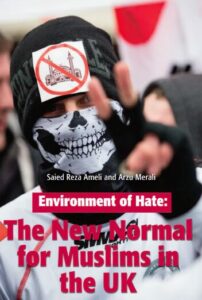 Environment of Hate: The New Normal for Muslims in the UK – Saied R. Ameli & Arzu Merali
Environment of Hate: The New Normal for Muslims in the UK – Saied R. Ameli & Arzu Merali
Environment of Hate: The New Normal for Muslims in the UK provides shocking insight into the UK as an ever developing ‘Stasi state’ rife with hatred for the ‘suspect’ Muslim community. With analysis at every level – from grassroots to institutions – the authors examine the construction of an environment where Muslims are feared and loathed.
The authors have implemented the Domination Hate Model of Intercultural Relations – a critical methodology that argues that hate crimes do not occur in a vacuum. Perpetrators are themselves victim citizens who have been mobilised by structural forces; namely the government and the media. Both perpetrator and victim alike are at the mercy of a broader context of hate policy, hate representation and hate environment.
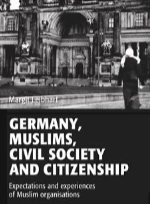 Germany, Muslims, Civil Society and Citizenship – Margit Liebhart
Germany, Muslims, Civil Society and Citizenship – Margit Liebhart
This book is an analysis of the results of that survey by Margit Liebhart. Combined with an overview of existing work in the field, Liebhart highlights minority issues within the context of Muslim-Germany in an effort to “assist those who wish to seek positive change in structuring minority-majority relations” in Germany and beyond.
The report illustrates that despite the strong Islamic roots embedded in the 3.5 million Islamic population of Germany, little has been done to achieve a permanent presence of Islam. This lack of presence partly emanates from a lack of “formal German citizenship,” and the “Guest-workers perception,” both of which she explores in detail.
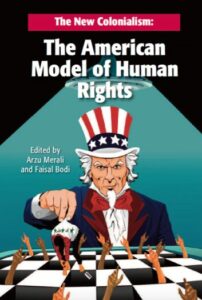 The New Colonialism: The American Model of Human Rights
The New Colonialism: The American Model of Human Rights
Based on IHRC’s conference of the same name, this book presents nine contributions from scholar-activists looking at how human rights as theory and practice have been co-opted by the US as part of a brutal, racist and colonial foreign and domestic policy. This book is a must-read for anyone concerned not just with US double standards but also the adulteration of the ideals of human rights as transformative discourse.
With papers from Saied R. Ameli, Laurens de Rooij, Mary K. Ryan, Saeed A. Khan, Tasneem Chopra, Sandew Hira, Ramon Grosfoguel, Rajeesh Kumar and Sohail Daulatzai.
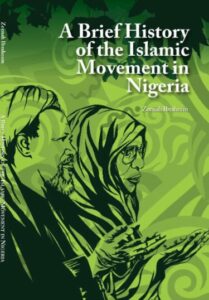 A Brief History of the Islamic Movement in Nigeria – Zeenah Ibraheem
A Brief History of the Islamic Movement in Nigeria – Zeenah Ibraheem
As a senior member of the Islamic Movement in Nigeria, Zeenah Ibraheem’s history of it is a first-hand account, not just of its ideas, and their fruition, but some of the many turmoil’s and persecutions it has faced in the last four decades.
This books covers some of the key incidents in the movement’s history, including the Funtua Declaration, as well as the Zaria Massacres of 2014 and 2015.
For the last 5 decades the RAND Corporation, the Brookings Institute and the Washington Institute for Near East Policy have focussed on developments in Western Asia (‘the Middle East). This focus increased exponentially after the 1979 Islamic Revolution in Iran. They have since produced highly influential policy recommendation on the region but more broadly Islam (as religious and political ideas) and Muslim
(as political subjects but also Islamically adherent actors) whether in the region or well beyond, including in minority situations.
Overviewing these three think tanks’ obsession with Islam and Muslims since the Islamic Revolution in Iran in 1979, Saghaye-Biria discusses the implications for Muslim societies of the direction of travel proposed.
This thorough backgrounder and analysis raises important and challenging questions for Muslim policymakers, political activists and civil society leaders, as well as providing important critique for those studying Islam and politics in the current era.
Other IHRC publications on Islamophobia include:
What’s Going on Here? US Experiences of Islamophobia between Obama and Trump – Saied R. Ameli & Saeed A. Khan
Once Upon a Hatred: Anti-Muslim Experiences in the USA – S.R. Ameli, Ahooei, E.M. & Merali, A.
France and the Hated Society: Muslim Experiences- S.R Ameli, A. Merali & E. Shahghasemi

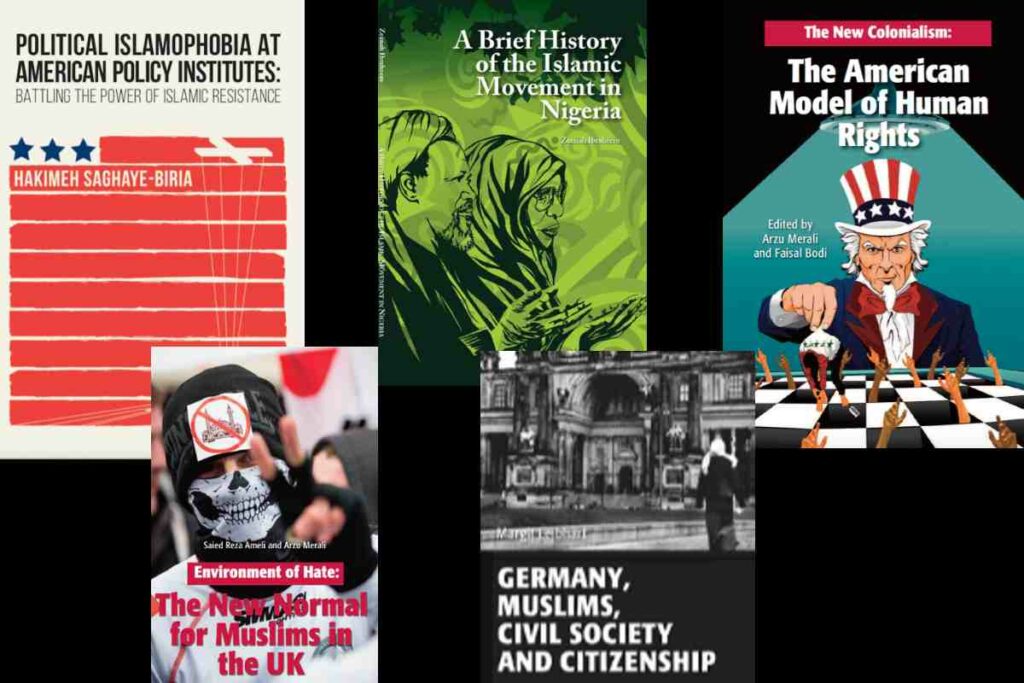
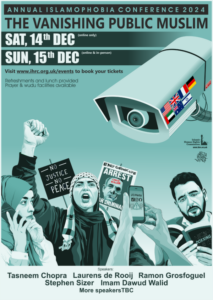 Islamophobia Conference 2024
Islamophobia Conference 2024 Support the People of Lebanon
Support the People of Lebanon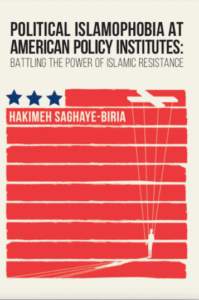 Political Islamophobia at American Policy Institutes: Battling the Power of Islamic Resistance – Hakimeh Saghaye-Biria
Political Islamophobia at American Policy Institutes: Battling the Power of Islamic Resistance – Hakimeh Saghaye-Biria
